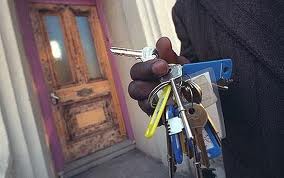Rafael Olmeda
It started as a routine eviction. Hanaraj “Andy” Ganaishlal, owner of a duplex in Coral Springs, had a tenant who wasn’t paying rent. So he went to court last December to get her out.
But the tenant, Tamica Jordan, 40, is no stranger to the process — court records show she has been evicted 10 times in nine years — and Ganaishlal, her latest landlord, is now locked in a legal battle to regain access to his own property.
Jordan rented the two-bedroom unit on the 4300 block of Northwest 110th Avenue in Coral Springs in August 2013, according to Ganaishlal’s attorney, Scott Chapman. She paid her first and second month’s rent of $1,350 each on time, according to court filings, but her check for October bounced and a third party paid for her.
Since then, according to Chapman and court documents, she has not paid a dime.
According to the Broward State Attorney’s Office, there’s not much in the law to stop someone from promising but failing to pay rent. As long as the tenant does not misrepresent herself or engage in a criminal action, such as providing the landlord with a false identity, the tenant is legally entitled to be on the property and cannot be prosecuted for trespassing or any other crime.
Ganaishlal, a postal worker, never ran a background check on his new tenant, Chapman said. If he had, he would have learned that she had nine eviction judgments against her in three states — California, Virginia and Florida — in the previous eight years.
Last year, Jordan was one of several South Floridians accused of taking advantage of Florida’s controversial adverse possession laws. According to court records, she somehow secured the keys to a vacant single-family house in Boca Raton and moved her belongings in, along with her two children.
The homeowner, who lives in Alabama, called the Palm Beach County Sheriff’s Office, but there was nothing they could do — the law’s protections for tenants led deputies to handle the matter as a civil dispute. Jones was able to stay in the house for months before the owner could have her removed through a formal eviction process.
A background check would have disclosed it all, Chapman said. “If you don’t run a background check in this day and age, you’re asking for trouble.”
Now, Chapman said, Ganaishlal is worried that he’ll face foreclosure on the property.
Kelly Gontarski, owner of the Pensacola-based StarPoint Tenant Screening firm, said technology has made it easier for landlords to research tenant histories regardless of where prior evictions have taken place.
“Companies like mine offer a national eviction search,” she said. “There are information providers we work with that aggregate information from courthouses across the country. We don’t have to visit every single county courthouse to gather the information. In the age of technology, information is pooled.”
Calls to Jordan, who is representing herself in court, were not returned last week and this week. In a March 2013 interview with the Sun Sentinel, she denied allegations of being a “serial squatter,” saying, “That all sounds crazy.”
Alan Sackrin, an attorney representing Jordan on a separate matter, said Jordan disputes previous media coverage of her cases, but declined to list any inaccuracies.
Ganaishlal won a judgment against Jordan on Jan. 22, but she filed an appeal last month that could extend the process for another 60 to 90 days. She also filed a lawsuit claiming the unit was damaged and uninhabitable, even though she was still living in it. Her claim is set for trial in June.
Source: sun-sentinel







